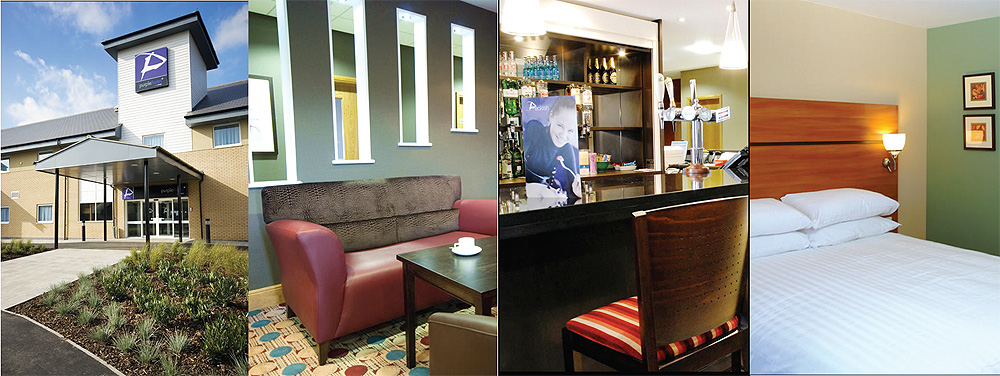
The Real Hotel Company
Style with function
The Real Hotel Company’s range of Purple Hotels is set to revolutionise the accommodation market
W ith over 100 years of operating history, and several incarnations, The Real Hotel Company has extensive experience in operating a number of hotel brands both in the UK and in Europe. Over the past few years, the business has focused on simplification: offering its core quality hotel services across a streamlined number of brands. The company operates 44 hotels in the UK, and 17 in continental Europe, under the Quality, Comfort, Stop Inn and Purple brands. The latter, Purple Hotels, has 11 locations across the UK, and is the organisation’s key growth brand at this time.
The Real Hotel Company CEO Michael Prager explains the reasons for the focus on the Purple brand: “Like all good strategies, this movement is in response to where we think the market is going, alongside what we are competent in providing as hoteliers. We believe that the market is polarising between top-end ‘destinations’ and low-cost hotels: At the top-end, there are hotels that people may want to visit because they are destinations in their own right, such as resorts in the Maldives, or the Dorchester in London. At the low-cost end of the spectrum, a hotel is chosen on the basis of it providing everything you need while you spend time in a location.
“Through the emergence of low-cost airlines, the public has been rightly educated in considering what they require from a hotel, especially on short-term weekend breaks,” Michael continues. “We define a Purple Hotel as everything you want, and nothing you don’t need – each quality room has a 5’6” or queen-sized bed, huge walk-in, power showers, air conditioning throughout, WiFi connection, and a flatscreen TV. Outside of London, at prices ranging between £55 and £85 a night, it won’t break the bank either, so it really encourages people to be smart with their money. Purple Hotels are the logical choice for short stays, as they contain everything a guest might need, so functionality underpins the ethos behind the brand.”
The focus of Purple Hotels is the style of the brand, and to maintain the levels of service the company prides itself upon at all levels. As Michael states enthusiastically: “We are trying to approach the market with a light-hearted demeanour, and put a smile on people’s faces, while at the same time remaining completely serious about making sure our customers get what we have promised. The company is marketing Purple Hotels as a premium, low-cost brand. As a consequence of focusing on simplicity, we can offer weekend rates as low as £29 a night, which, in some cities, is cheaper than a taxi ride home! Customers can make reservations and read my blog at www.purplehotels.co.uk, as well being able to book via our call centre at 08444 823 823.”
One differentiating factor between Purple Hotels and other brands on the market is the company’s aim to provide everything a guest would expect. “As well as providing great rooms, we also offer a phenomenal breakfast for only £7.95 (£9.95 in London) – currently the best value in the industry,” Michael comments. “This includes charcuterie, cheeses, breads, a daily fresh fruit salad, cereals and a hot buffet, including a Spanish omelette bar – they taste better if you call them tortillas like the Spanish do. What we have tried to do as an operation is to focus on the standard of our breakfasts, as 80 per cent of Purple’s guests will have this meal. We have more than achieved this, and people are recognising the effort that has gone into this area. We also offer a decent gastro-pub dinner menu, ranging from paninis and sandwiches to main courses, in a stylish bar restaurant surrounding. We’re not trying to be restaurateurs, but we are offering good, well priced, well cooked food that today’s guests want, if they’re not going out in the evening.”
Naturally, all choices made by the company regarding ingredient supply reflect contemporary concerns, such as food miles, compassionate farming and organic production. Michael emphasises Purple Hotels approach to providing food: “We serve traditional British food, as well as a decent range of vegetarian options. We understand that where people eat is fundamentally down to them – we concentrate on offering quality meals should they choose to eat at a Purple Hotel. Within our sector, we need uniformity across the brand, and this applies to food – this is what we have found that guests want, and this is what allows us to keep prices competitive and low. It means that we don’t have to re-invent business processes at every location.”
As the growth brand of the business, there are set targets associated with Purple Hotels over the coming years, as Michael is keen to highlight: “Purple Hotels is developing sites in Sheffield and Ipswich this year, with a further 2200 rooms under offer in the deal process at locations such as Chester, Tamworth, and Birmingham – the second Purple Hotel in the city across 2009. We are on the way to meeting our target of 4000 rooms by 2012, yet this is a modest aim – through exerted effort, we could achieve even more. We won’t sacrifice our standards on a conversion project, and all of our hotels must meet our brand standards.
“The markets for accommodation and restaurants are only going to grow,” Michael acknowledges. “The need and desire to travel has moved from being a privilege to a right in regards to leisure. Equally, as much as technology has shrunk the world in terms of communication, business still forces people to travel – as the old saying goes, you can’t fax a handshake. Brands such as ours are redefining the vague middle-market that exists between high and low budget – we are really good hoteliers, who can provide you with a great room and a superb breakfast,” he concludes.